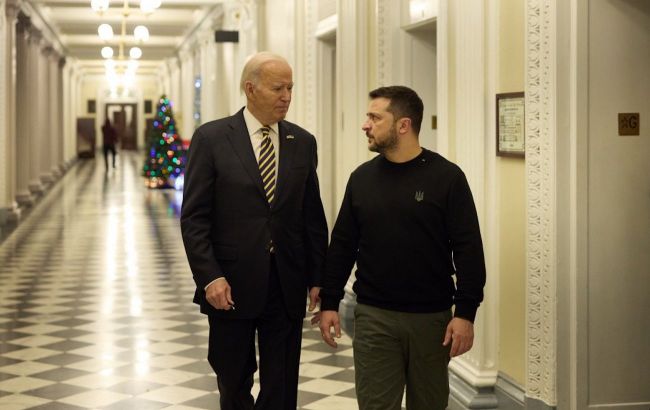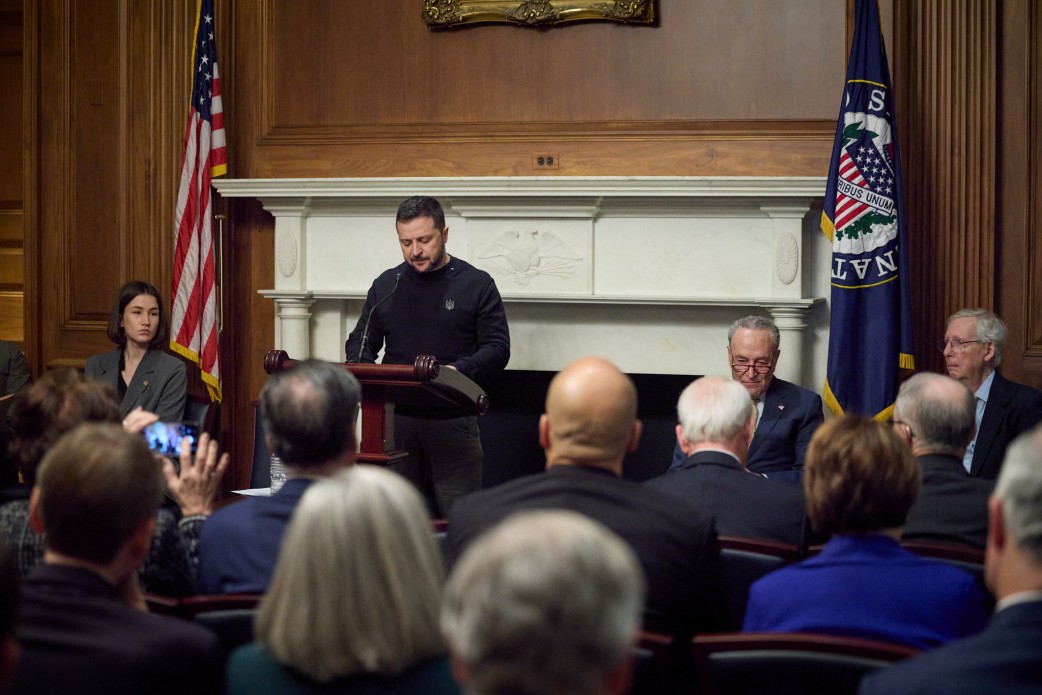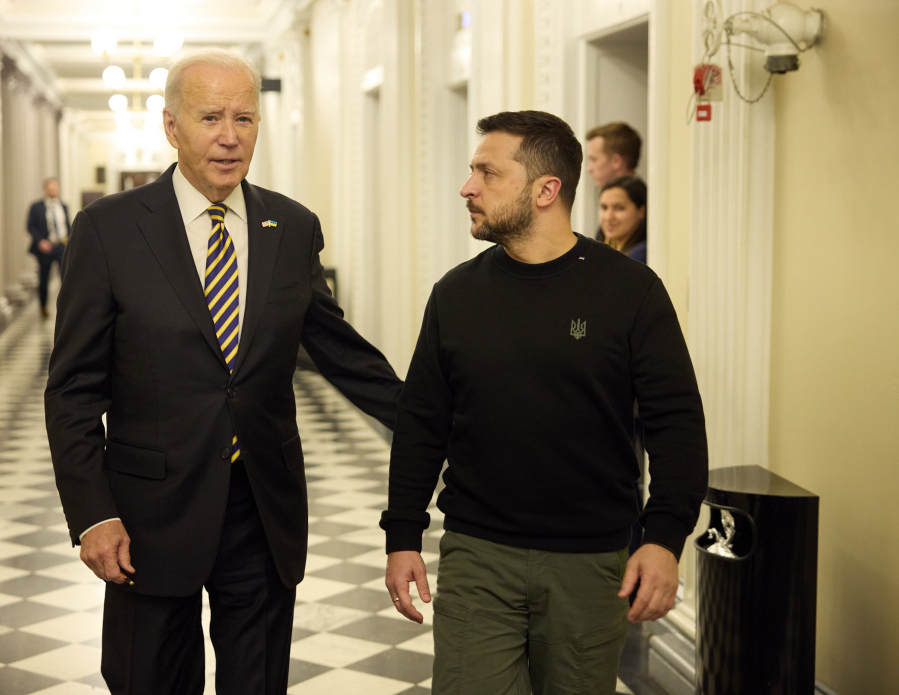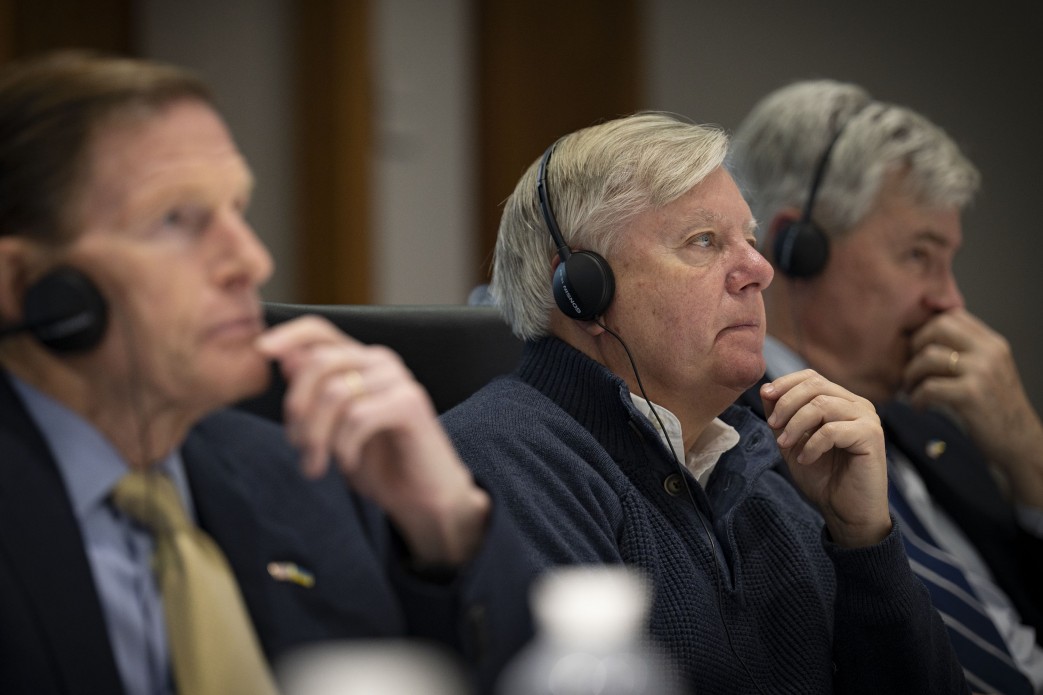Debates in U.S.: Key points and package decision timeline by year-end
 Volodymyr Zelenskyy during the meeting with Joe Biden on his visit to the United States last week (photo: president.gov.ua)
Volodymyr Zelenskyy during the meeting with Joe Biden on his visit to the United States last week (photo: president.gov.ua)
The U.S. assistance to Ukraine is expected to be depleted by December 30, 2023. Democrats and Republicans are working to reach a compromise on a package of over $60 billion for our country, but conflicting signals are being sent, and it is unlikely that an agreement will be reached by Christmas.
Sources for this material include publications from ABC News, The Washington Post, The Wall Street Journal, and exclusive comments from Oleksandr Kraiev, an analyst at the Ukrainian Prism Center.
Debates continue, but signals are contradictory
The debates between Republicans and Democrats, which are expected to pave the way for a multi-billion-dollar aid package to Ukraine in 2024, show no signs of cessation. Over the weekend, senators sent conflicting signals. Democrats talk about a close deal, possibly by the end of this week. Republicans disagree, saying the deal won't happen until next year.
Negotiations resumed after Senate Republicans blocked a $110.5 billion bill, which, among other things, includes about $61 billion for Ukraine. This is roughly half of all funds the Pentagon is set to receive next year for tank purchases, artillery, and other armaments, as reported by The Washington Post. Republicans are willing to support the package only if there is a decision to enhance border control with Mexico.
American media reports that in personal communication with Ukrainian President Volodymyr Zelenskyy, senators and House representative Mike Johnson (Republican from Louisiana) expressed understanding of the difficult situation. However, they did not change their views on the idea that assistance to Ukraine should be addressed in tandem with border issues amid record levels of illegal migration.
The Washington Post describes Zelenskyy's visit on December 11-12 as dramatic but disappointing. Some Republicans still oppose military aid, following the rhetoric of Donald Trump. Recently, he quoted Russian dictator Vladimir Putin, calling Joe Biden a threat to democracy, and praised Hungary's Prime Minister Viktor Orban and North Korea's leader Kim Jong Un.

Photo: Meeting of Volodymyr Zelenskyy with U.S. Senators (president.gov.ua)
The leader of the Democrats in the U.S. Senate, Chuck Schumer, described the meeting with Zelenskyy as very powerful, indicating that the president made it clear that if he receives assistance, he will win the war. Zelenskyy himself spoke of friendly and frank negotiations, thanking the senators for the bipartisan support of Ukraine.
However, the leader of the Republicans in the U.S. Senate, Mitch McConnell, doubts that Congress will have time to approve the package before Christmas, even if an agreement is reached in the coming days. He called on Biden to become even more actively involved in negotiations on strengthening immigration policies. According to him, without this, there will be no agreement.
White House National Security Council Coordinator John Kirby talks about Biden's personal involvement in reaching a compromise. Last week, the House of Representatives went on a three-week Christmas break, raising the issue of aid to Ukraine in the air. The Democratic majority in the Senate delayed their break in hopes of reaching an agreement with Republicans. To vote on the package by the end of the week.
" So much depends on our success. We know the world is watching us," added Chuck Schumer.
Oleksandr Kraiev, an analyst at the Ukrainian Prism Center, believes that Zelenskyy's visit was unlikely to be decisive but an important argument for senators to continue their work.
"We remember a good productive meeting with McConnell and Schumer. Zelenskyy's visit was clearly not decisive, but the meeting with the senators helped with that. It became clear who supports which package, who is willing to take what actions, and whether a compromise is possible. And, of course, it is a matter of national security, supporting allies, and restraining strategic opponents. It seems to me that this is the main reason why they decided to go on vacation later and revise the issues," he noted in a comment to RBC-Ukraine.
The House of Representatives is hanging Ukrainian aid in the air?
U.S. President Joe Biden emphasizes the urgent need for assistance to Ukraine and Israel. Pressure on lawmakers is increasing, negotiations continued over the weekend, and, according to Chuck Schumer, significant progress has been made on the border issue. He also believed that the parties could reach a framework agreement and vote in the coming days.
"After weeks of deadlock, we have seen significant progress over the past few days, and we should take advantage of the opportunity, because we may not get one again for quite a while. It is not easy to reach an agreement on something this complicated, but so much hangs on our success, so we need to try with everything we have," Schumer stated.
He also noted that the whole world, including Vladimir Putin, is watching Congress, and Putin recently stated at a press conference that there would be no peace in Ukraine until Russia achieves the goals of the so-called special operation. Responding to this, John Kirby expressed hope that Republicans clearly heard Putin's message and would not hold Ukraine's aid hostage.
After the meeting with Zelenskyy, Biden stated that Putin is betting on the inability of the U.S. to help Ukraine, and lawmakers must prove him wrong.
"The United States Congress must act. Congress needs to pass the supplemental funding for Ukraine before they break for the holiday recess, before they give Putin the greatest Christmas gift they could possibly give him," he said, adding that the absence of aid would negatively impact Ukraine's military capabilities and play into the hands of Russia.

Photo: Joe Biden after meeting with Volodymyr Zelenskyy warned Republicans that they could make a Christmas gift to Putin (president.gov.ua)
Meanwhile, Republicans are not willing to back down from border demands. Senate Minority Leader Mitch McConnell complained that Democrats have to explain why border issues are in the interest of America's national security.
" We can't pretend to be serious about threats facing America and our allies without fixing the broken system that lets 10,000 illegal aliens cross our border in a single day," he added.
It's noteworthy that on Wednesday, the House of Representatives officially launched an impeachment investigation into Biden. Its resolution instructs the continuation of the investigation, although there has been no clear evidence presented so far that Biden was directly involved and benefited from the business dealings of his son Hunter and brother James. Biden himself interpreted the impeachment move as a sign that Congress's priorities are not in order. In his view, instead of going on vacation, lawmakers should focus on aiding Ukraine, Israel, ensuring law and order on the southern border, and preventing a shutdown.
According to the initial plans, the House of Representatives will return from recess on January 9, with about two weeks to continue funding the government after the 19th. Consequently, even if the Senate approves the package in the coming days, lawmakers will vote next month. However, there is some room for maneuver.
"The Senate has the authority to call the House of Representatives into an emergency session if the issue concerns national security or is extremely important for U.S. national interests," explained RBC-Ukraine analyst Oleksandr Kraiev.
Package by year-end? There's a chance, but Republicans are eyeing January
The results of the debates do not add optimism at the moment. As reported by The Wall Street Journal, over the weekend, senators failed to reach a framework agreement on border security. This, in turn, reduces the chances of voting on the package for Ukraine before Christmas.
The lack of real progress indicates the difficulties faced in the Senate, despite signals from the Biden administration about its readiness to make significant concessions. Many Republicans are skeptical about any deal, while Democrats are concerned that the White House is giving in to political opponents.
"We have to work through a myriad of issues, and there are many different ways to address the problems. We must choose the one that works best and allows us to garner the votes of both chambers and both parties," said Democratic Senator Kyrsten Sinema (Arizona).
Sinema, along with Democratic Senator Chris Murphy from Connecticut and Republican Senator James Lankford from Oklahoma, met with Secretary of Homeland Security Alejandro Mayorkas to discuss strengthening border security. The results of the meeting have not been detailed yet, but it is noted that the negotiations will continue.
The White House, supported by Democratic negotiators, has expressed readiness to establish a new body to handle the deportation of undocumented immigrants. It is expected that this move will grant more authority to the government in denying asylum seekers. Currently, all parties - Republicans, Democrats, and the Biden administration - acknowledge the difficulty of putting detailed plans on paper.
Some legislators emphasize that it's premature to speculate on voting deadlines without final formulations and doubt that such text could be drafted before Christmas. On Sunday, Mitch McConnell directed the following content to Republican senators: "Without text and sufficient time to review it, it would not succeed. There are significant issues still under discussion and a lot of very technical work on drafting which takes time to get right."

Photo: Republican Senator Lindsey Graham says the deal on the package for Ukraine won't happen before January (president.gov.ua).
Some Republicans argue that the window of opportunity for 2023 is closed. A group of fifteen senators is requesting a separate meeting of the Republican caucus on January 8. Senator John Barrasso from Wyoming announced that he would work on planning such a meeting.
"The bottom line here is we feel like we’re being jammed. I will not help Ukraine, Taiwan, or Israel until we secure a border that’s been obliterated. I spoke to people from the White House five days ago. We haven't even come close to a deal. It will happen next year," added Senator Lindsey Graham from South Carolina.
Republicans believe that the current initiatives from the White House are insufficient. They insist on denying asylum to migrants who have not sought humanitarian protection in the first safe country they passed through, such as Mexico. They also demand restrictions on the practice of parole, which allows migrants to legally enter and reside in the U.S. until their case is heard in court. This measure allows the U.S. government to quickly admit migrants without a visa.
The Biden administration has widely exercised this prerogative, initially for evacuated Afghans, then for refugees from Ukraine, and now for individuals seeking asylum who have pre-registered on government resources. According to official data, over 350,000 people have entered the U.S. through this process since 2021.
The speed of the negotiations is also influenced by the fact that any changes in immigration policy can garner support from some lawmakers while alienating others. To pass most laws in the Senate, 60 votes are required, and only significant support from Senate Republicans will contribute to positive voting in the House of Representatives.
Despite this, analyst Oleksandr Kraiev remains optimistic, as there are signs of compromise emerging both from the White House and among Republicans.
"Even McConnell says that behind many positions, they have seen the light at the end of the tunnel. Indeed, following the classic American political pattern, the issue may be resolved in the last days of the year. There's no need to give up hope. There is a chance that they will reach an agreement by the end of the week. But, of course, there is a much greater chance that U.S. lawmakers will return to this issue in the second week of January. For now, we have what we have, and we hope for the best," he noted in a conversation with the publication.
"The main positive aspect is that the question of whether billions will be allocated for Ukraine or not is not off the table. The issue lies in when exactly a compromise will be reached. Currently, there are two options – by Christmas or in the following month. The signals from the U.S. keep the hope alive for a necessary decision by the end of the year, at least in the U.S. Senate," Kraev added.
In commenting on the American debates, Ukrainian Ambassador to the U.S. Oksana Markarova expressed her belief in a Christmas miracle.
"At the moment, all attention is focused on Congress. We can only pray and hope for determination. That the agreement they can reach will allow for a prompt decision regarding support for Ukraine," she noted on CBS.
Meanwhile, the Pentagon has, for the first time, specified the exact date when funds for assistance to Ukraine will be depleted. It is reported that the last $1.07 billion for the purchase of arms and equipment to replenish U.S. stocks, instead of being transferred to our country, will be allocated by December 30. After this date, shipments will effectively cease without Congress deciding on new funding.

